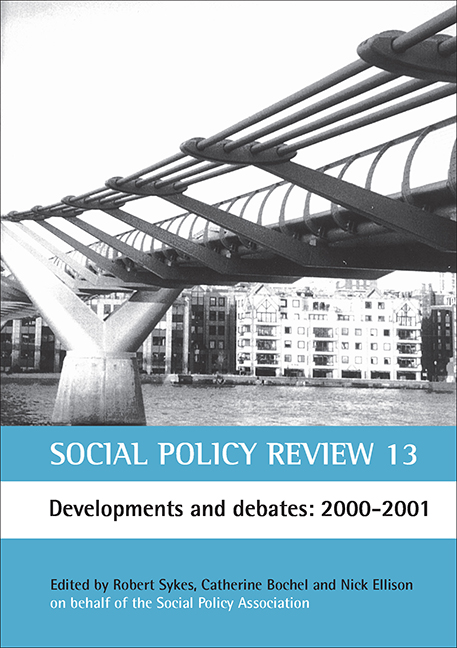eight - Politics and its impact on social policy in Taiwan, Hong Kong and mainland China
Published online by Cambridge University Press: 20 January 2022
Summary
This chapter discusses the politics of social policy making in East Asia. The three polities covered by the study are chosen not for their political or cultural proximity but for the differences in their political and social systems. What emerges from this chapter is that despite significant political linkages in the past, current political and social policy developments seem to be moving along quite distinct and different pathways in each system. After giving a description of the development of political institutions in each, the chapter analyses the impact of politics on social policy making in each, that is, the course of welfare state development, and examines the basic design of the different welfare state systems and their overall development since 1945. Then the chapter proceeds to discuss the overall impact of various political determinants on social policy making, and closes by projecting the past development of these welfare states into the future.
The Taiwanese political system
After the outbreak of the Chinese civil war in the late 1940s, the Nationalist forces under Chiang Kai-shek lost control over the mainland and had to retreat to Taiwan which was situated far enough away from the Fujian coast so that it could not be taken by the Communist forces. After the retreat, President Chiang Kai-shek, proclaimed martial law that had been lifted four decades later, on 15 July 1987. During the days of the civil war with the Communists, the Nationalist government promulgated a new constitution, on 1 January 1947. In 1948, the government amended the constitution in order to give the president the power of proclaiming martial law. This amendment came to be known as the Temporary Provisions. Another amendment in 1966 gave the president the power of calling for elections for the National Assembly and the Legislative Yuan, the two houses of the parliament, in order to fill vacancies caused by natural deaths of those MPs who had become quasi lifetime parliamentarians after general elections had been set out with the promulgation of the Temporary Provisions. New elections for all of the Legislative Yuan and National Assembly seats had been held in 1991 and 1992 respectively. Finally, in 1992, as a result of a judicial decision of the Council of Great Justice, the last of the lifetime parliamentarians had to retire.
- Type
- Chapter
- Information
- Social Policy Review 13Developments and Debates: 2000–2001, pp. 157 - 180Publisher: Bristol University PressPrint publication year: 2001

